What is 4×8 Aluminum Checker Plate?
4×8 aluminum checker plate refers to an aluminum sheet with a size of 4 feet by 8 feet and a checker plate pattern on its surface. The 4×8 aluminum checker plate pattern consists of raised diamond-shaped projections or lines, providing enhanced grip and traction. The 4×8 aluminum checker plate is commonly used in applications that require slip resistance and durability, such as ramps, stair treads, flooring, and vehicle running boards. The 4×8 dimensions make it a convenient size for various construction and industrial projects, offering a large surface area coverage.
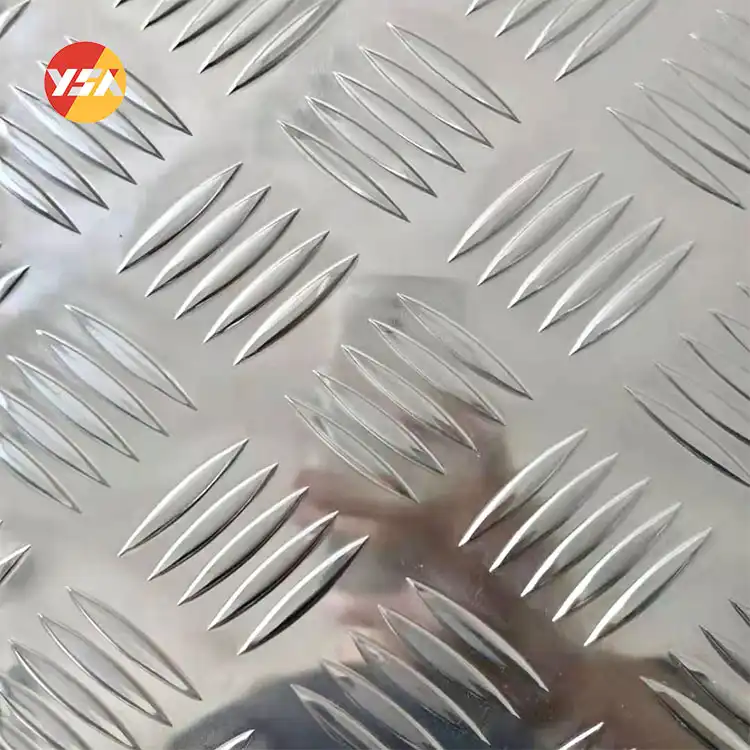
Properties of 4×8 Aluminum Checker Plate
Physical Properties of 4×8 Aluminum Checker Plate
| Property | Value |
| Thickness | Varies (Typically 1.5mm – 6mm) |
| Length | 8 feet (2438 mm) |
| Width | 4 feet (1219 mm) |
| Weight | Varies (Dependent on thickness) |
| Density | Approximately 2.7 g/cm³ |
| Surface Pattern | Checker Plate (Raised diamond-shaped projections or lines) |
| Surface Treatment | Mill Finish, Anodized, or Painted |
| Color | Silver (Natural Aluminum) |
Chemical Composition of Commonly Aluminum Alloys
| Element | Alloy 3003 (%) | Alloy 5052 (%) |
| Aluminum (Al) | 98.6 | Remainder |
| Manganese (Mn) | 1.2 – 1.5 | – |
| Copper (Cu) | < 0.05 | < 0.1 |
| Iron (Fe) | < 0.7 | < 0.4 |
| Silicon (Si) | < 0.6 | < 0.25 |
| Zinc (Zn) | < 0.1 | < 0.1 |
| Magnesium (Mg) | – | 2.2 – 2.8 |
| Chromium (Cr) | – | 0.15 – 0.35 |
| آحرون | < 0.15 (each) | < 0.05 (each) |
Basic Performance of 4×8 Aluminum Checker Plate
| Performance Characteristic | Description |
| Slip Resistance | Provides enhanced grip and traction |
| Durability | Resistant to corrosion and wear |
| Lightweight | Relatively low density for easy handling |
| High Strength | Offers good strength-to-weight ratio |
| Weather Resistance | Withstands exposure to various weather conditions |
| Non-Magnetic | Does not attract or hold a magnetic charge |
| Thermal Conductivity | Efficient heat transfer |
| Electrical Conductivity | Good electrical conductivity |
| Formability | Can be easily formed into desired shapes |
| Weldability | Can be welded using appropriate methods |
| Surface Protection | Can be anodized or painted for added protection |
| Aesthetics | Attractive checker plate pattern appearance |
What is the Process of 4×8 Aluminum Checker Plate?
The specific processing process for 4×8 aluminum checker plate involves several steps. Here’s an overview of the typical process:
- Material Selection: Start by selecting the appropriate aluminum alloy based on the desired properties and application requirements of the checker plate, such as strength, corrosion resistance, and formability.
- Casting or Rolling: The selected aluminum alloy is either cast into ingots or directly rolled into large coils, depending on the manufacturing method employed.
- Hot Rolling: The aluminum coils are heated and passed through a series of rolling mills to reduce the thickness and increase the length.
- Cold Rolling: The hot-rolled coils undergo a cold rolling process to further reduce the thickness and improve the surface finish.
- Annealing: The cold-rolled coils may undergo an annealing process, which involves heating and controlled cooling, to enhance the material’s ductility and remove any residual stresses.
- Surface Treatment: The aluminum sheets are cleaned, degreased, and prepared for surface treatment, which can include options such as mill finish, anodizing, or painting. The choice of surface treatment depends on the desired appearance, corrosion resistance, and durability.
- Pattern Embossing: The surface of the 4×8 aluminum checker plate is embossed with a checker plate pattern using specialized embossing rolls or presses. This process creates the raised diamond-shaped projections or lines on the surface.
- Cutting and Shearing: The embossed aluminum sheets are cut into the desired size of 4×8 feet using cutting machines or shearing equipment.
- Quality Inspection: The finished 4×8 aluminum checker plate undergoes thorough quality inspections to ensure they meet the required specifications and standards. This may include visual inspection, dimensional checks, and mechanical property testing.
- Packaging and Delivery: The inspected checker plates are carefully packaged to protect them during transportation and then delivered to customers or distributors.
Advantages of 4×8 Aluminum Checker Plate
Advantages
Durability
Corrosion resistance
Lightweight
Slip resistance
High strength-to-weight ratio
Easy maintenance
Versatility
Recyclability
Application of 4×8 Aluminum Checker Plate
- Elevator Floors: 4×8 aluminum checker plate is often used as flooring material in elevators. It offers a durable and slip-resistant surface for elevator passengers, making sure safety and aesthetic appeal.

- Step Treads: The raised checker pattern on the aluminum plate makes it ideal for step treads in many kinds of uses. It offers enhanced grip and slip resistance, making it suitable for stairs in commercial buildings, industrial facilities, and outdoor areas.

- Truck Toolbox: Aluminum checker plate is commonly used to construct truck toolboxes. Its durability and resistance to corrosion make it an ideal material for protecting tools and equipment during transportation.

- Trailer Flooring: 4×8 aluminum checker plate is extensively used as flooring material in trailers, specially in industries such as logistics, transportation, and agriculture. It offers durability, corrosion resistance, and improved traction for safe loading and unloading.
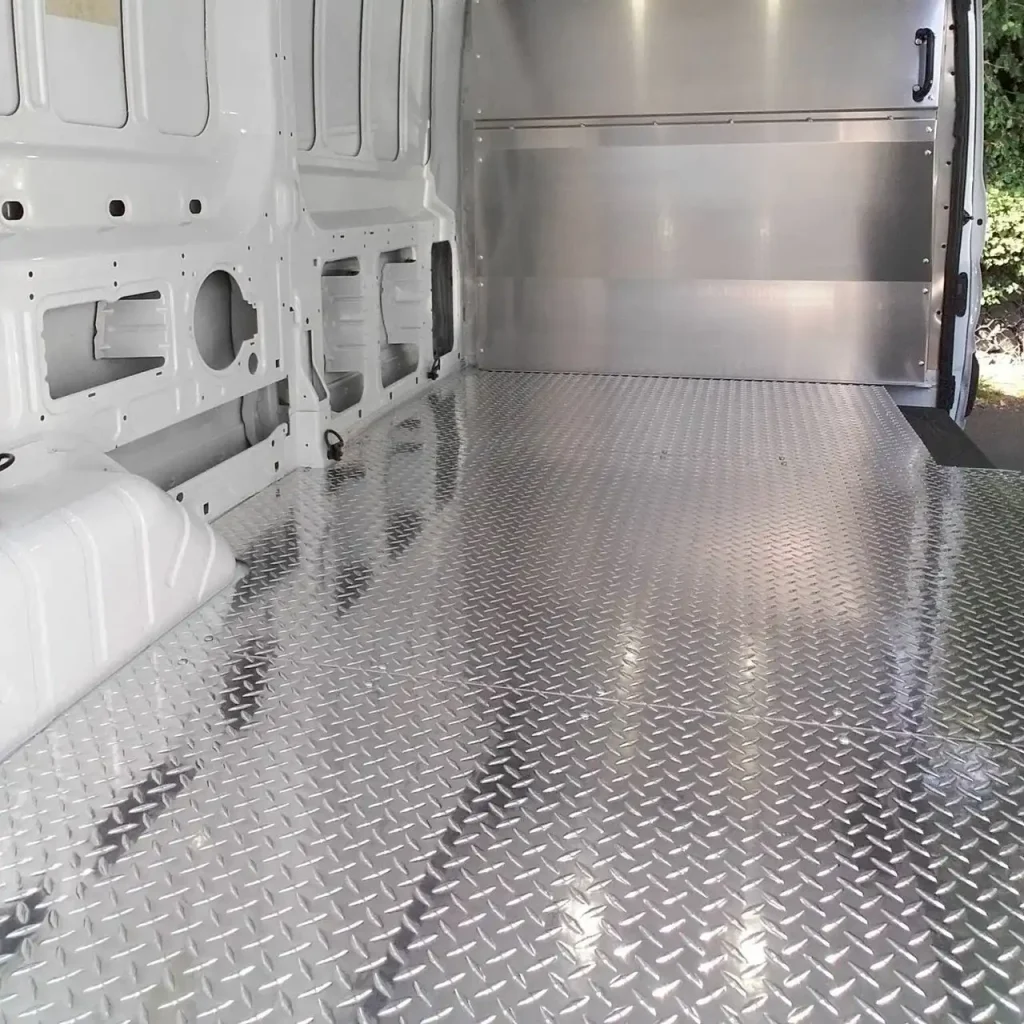
- Vehicle Trim and Accents: Aluminum checker plate is often used for decorative purposes in automotive applications. It can be used for trim, accents, and protective panels on vehicles to improve their aesthetic appeal and provide a distinctive appearance.

- Workbenches for Industry: Workbenches and workstations for industry employ aluminum checker plate. Heavy-duty applications in manufacturing and assembly settings are appropriate for it due to its robustness, ease of maintenance, and resistance to wear.
- Wall Cladding: In commercial and industrial structures, aluminum checker plate can be utilized for wall cladding. It offers an aesthetically pleasing, long-lasting, and low-maintenance way to provide walls protection and texture.
- Equipment Platforms: 4×8 aluminum checker plate is used in the construction of equipment platforms across a wide range of industries. Because of its strength, low weight, and resistance to corrosion, it’s a great material to use when building stable platforms for machinery and equipment.
Other Types of Aluminum Checker Plates
There are numerous additional varieties of metal checker plates available in addition to the 4×8 model. The alloy composition, pattern design, thickness, and size of these variants vary. Here are few instances:
- 5-Bar Aluminum Checker Plate: This kind of checker plate has a crosshatch pattern made up of five elevated parallel bars. It is frequently used in flooring, stairways, ramps, and industrial applications because of its exceptional slip resistance.

- 2-Bar Aluminum Checker Plate: Two raised parallel bars span the surface of the 2-bar aluminum checker plate, creating a straightforward but effective design. It has exceptional slide resistance and is frequently utilized in furniture, architectural accents, and decorative applications.

- 3-Bar Aluminum Checker Plate: The 3-bar checker plate is made up of three elevated parallel bars arranged linearly, just as the 2-bar design. It is frequently utilized in industrial, interior design, and transportation applications and offers a moderate level of slip resistance.

- Diamond Aluminum Checker Plate: The surface of the diamond pattern checker plate is covered in a row of raised diamonds. It is extensively utilized in industrial flooring, ramps, stairs, and transportation applications due to its exceptional slip resistance.
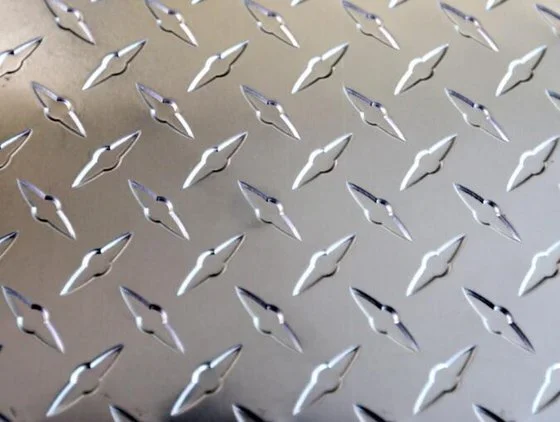
- Embossed Aluminum Plates: This kind of checker plate has different designs embossed on its surface, such as pebble, hammer, or stucco patterns. It is appropriate for decorative applications, architectural accents, and non-slip surfaces because it offers both visual appeal and slide resistance.

- Colored Aluminum Checker Plate: Aluminum checker plates can also be coated or painted in various colors to meet specific design requirements. Colored checker plates are commonly used in architectural projects, signage, and decorative applications.
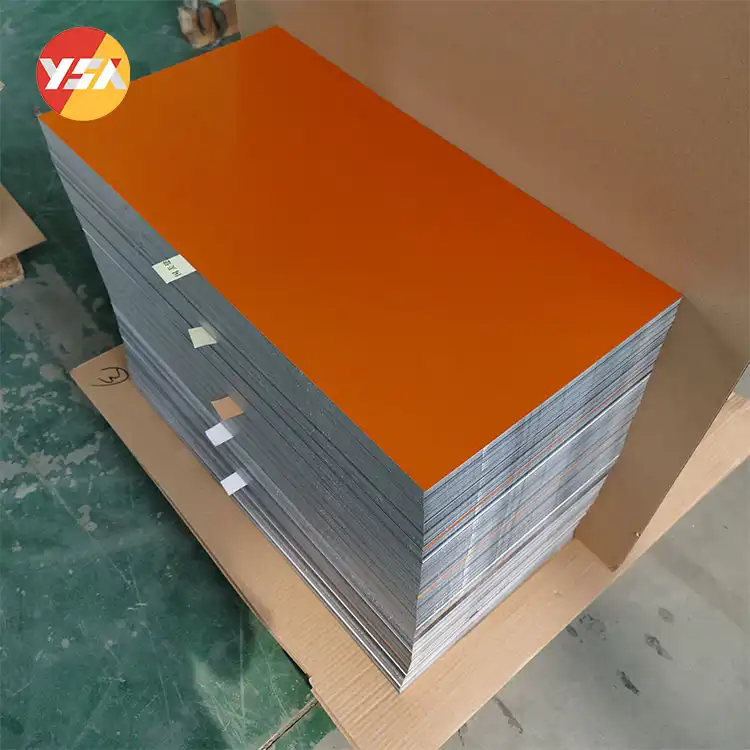
Summary
In conclusion, the 4×8 aluminum checker plate is a versatile and practical material that provides a range of advantages in many kinds of uses. Its durability, corrosion resistance, and lightweight nature make it excellent for transportation, architectural design, industrial flooring, and more. The checker pattern on its surface provides improved slip resistance, making sure safety in high-traffic areas. With its high strength-to-weight ratio, it offers structural integrity without adding excessive weight. What’s more, the easy maintenance, aesthetic appeal, versatility, and recyclability of 4×8 aluminum checker plate further contribute to its appeal.
Whether it’s used in elevator floors, truck toolboxes, trailer flooring, or industrial workbenches, the 4×8 aluminum checker plate combines functionality and visual appeal. Its wide range of applications speaks to its reliability and efficiency in meeting diverse needs. As industries continue to evolve, the 4×8 aluminum checker plate remains a trusted choice for its durability, performance, and adaptability.
In summary, the 4×8 aluminum checker plate is a valuable material that brings together strength, corrosion resistance, and slip resistance in a lightweight package. Its numerous advantages make it an excellent choice for a wide range of uses, providing a durable and reliable solution for various industries.
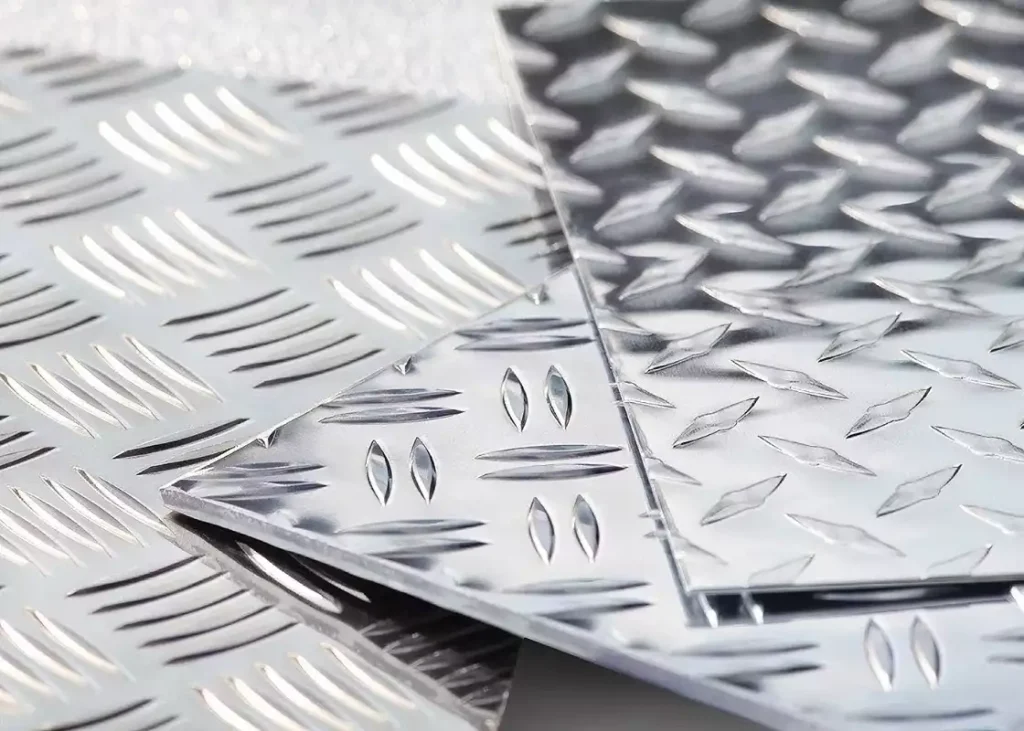
FAQ
What are the three most important properties of aluminium?
Aluminum’s high thermal and electrical conductivity, superior corrosion resistance, and low density are its three most valuable characteristics.
What is the most common aluminum plate?
The 6061 aluminum plate is the most often utilized type of aluminum plate. Strength, resistance to corrosion, and machinability are all combined in this adaptable alloy. Many industries, including aerospace, automotive, marine, construction, and general engineering, use 6061 aluminum plate extensively.
What is the best aluminum plate material?
What makes an aluminum plate “best” depends on the particular needs of the application. However, 7075 aluminum is frequently recognized as a superior option. Recognized for its remarkable strength-to-weight ratio, 7075 aluminum plate provides high strength on par with numerous steel alloys, but with a much lower weight.


